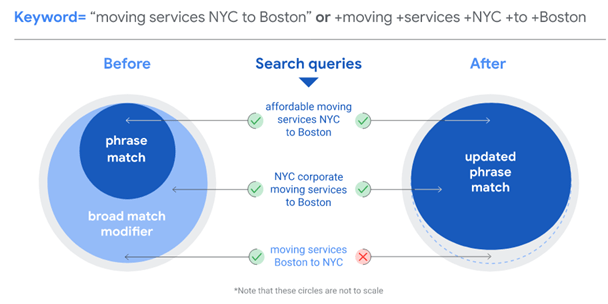RIP Google Ads Broad Match Modifier – What You Need to Know
Google recently announced some changes to keyword match types for paid search campaigns. Keyword match type defines what search terms can trigger your ads to appear in paid search results. So we have search terms on one side, campaign keywords on the other, and depending on how they match, certain ads appear in search results.
Before the change, there were 4 match types – Broad, Broad Match Modifier (BMM), Phrase, and Exact. Now it is down to three – Broad, Phrase, and Exact. BMM is obviously being phased out, but that is not the only change. Phrase match has now been updated to be less restricted and include more keyword variations, which essentially makes it a mix between BMM and old Phrase.

Here is a visual of what this looks like from Google:
Google claims this change will simplify the keyword structure, which is fair, but how it will actually affect the campaigns? Here are a few things to keep an eye on:
- BMM keywords will now drive fewer impressions because some matches that previously matched to BMM will be filtered out. At the same time, if your account has a significant portion of clicks and conversion coming from BMM keywords these will likely decrease.
- Phrase match keywords will drive more impressions, so the impact will be the opposite – if your account has a significant portion of clicks and conversion coming from Phrase match keywords, these will likely increase.
- Additionally, BMM keywords were previously often used to cast a wider net of searches and yet still have some control over them This will become more complicated with the recent changes, and will be especially impactful for accounts with limited search volume.
So, what’s next given these changes? Here’s what you need to consider:
• For existing BMM keywords, all the changes were auto applied, so no actions are needed for the transition. The BMM match type will be completely retired in July 2021 and no new BMM keywords can be created.
• We recommend keeping an eye on your accounts to see whether there is a decrease in impressions, and work on adding new phrase match keywords to make sure the semantic core is covered within the new set of keywords.
• For accounts that see an increase in impressions, we recommend looking closely and regularly into the search terms report and ensure the list of negative keywords is up to date.
• For new campaign setups, there is no point using BMM keywords and we recommend working with Phrase match instead.
• To cast a wider net and not lose reach, there are two main options – 1) either adding more short tail Phrase match keywords, trying to work on all possible variations or 2) using broad match keywords in combination with smart bidding, which is one of Google’s main suggestions on how to react to the change, and possibly one of the main reasons for the change in the first place. There are other opportunities to be tested here as well, for example layering in audience targeting on top of broad match keywords to narrow down the audience size by adding relevant interests.
Match types have changed quite a bit over the past couple of years and with machine learning playing more of a role, Google believes that they can combine these match types together and provide users with the most relevant results. We will be looking into the actual impact of these changes and testing different options so keep an eye on our blog for updates!
